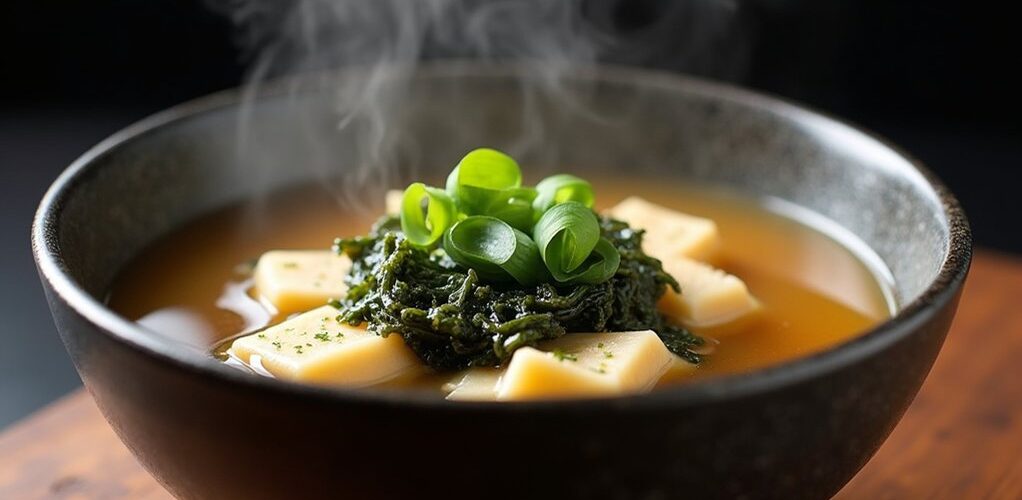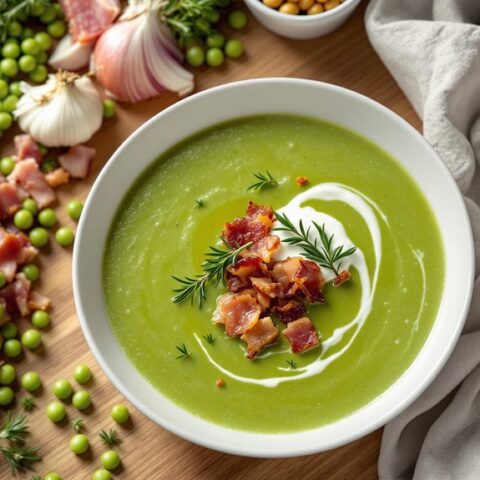
Miso soup qualifies as a low-carb dish, containing approximately 5.45 grams of net carbohydrates per standard cup serving. This traditional Japanese soup combines fermented miso paste with dashi broth, offering substantial health benefits while maintaining relatively low carbohydrate levels. The exact carb content varies based on additional ingredients, with options ranging from 3 to 7 grams per serving. Understanding ingredient choices and portion sizes enables greater control over the soup's nutritional profile.
Key Takeaways
- A standard cup of miso soup contains approximately 5.45 grams of net carbohydrates, making it relatively low-carb friendly.
- Traditional miso soup can fit into most low-carb diets when consumed in moderation and prepared with careful ingredient selection.
- Carbohydrate content varies between 3-7 grams per serving depending on the type of miso paste and additional ingredients used.
- Hatchomiso variety offers the lowest carbohydrate content among traditional miso pastes for carb-conscious consumers.
- The soup maintains low calories (40-50 per bowl) while offering protein and nutrients through ingredients like tofu and seaweed.
Understanding Miso Soup Basics
The essence of miso soup lies in its remarkably simple yet flavorful composition, combining traditional Japanese ingredients to create a nourishing staple of Asian cuisine.
At its core, this traditional Japanese soup consists of two fundamental components: miso paste, a fermented soybean paste rich in umami flavor, and dashi broth, typically derived from dried fish or seaweed.
These base ingredients work together to create a distinctive taste while maintaining relatively low carbohydrates in the final dish.
The inclusion of miso paste not only provides the soup's characteristic flavor but also contributes valuable protein and nutrients, while the dashi broth adds depth without greatly impacting the carbohydrate content, making miso soup an excellent option for those monitoring their carb intake.
Carbohydrate Content in Miso Soup
A standard cup of miso soup contains approximately 5.45 grams of net carbohydrates, with variations depending on additional ingredients and preparation methods.
The miso paste itself contributes considerably to the carbohydrate content, containing around 4 grams of carbs per tablespoon, which can impact those following strict low-carb dietary protocols.
For individuals seeking lower-carb alternatives, selecting specific varieties like Wakameseaweed or Shijimiclammiso miso soup can provide slight reductions in carbohydrate content, though the differences may be minimal for those on ketogenic diets.
Net Carbs Per Serving
When examining miso soup's carbohydrate content, consumers will find approximately 5.02 grams of carbs per one-cup serving, with variations ranging from 3 to 7 grams depending on specific ingredients and preparation methods.
Traditional miso soup's net carbs come primarily from the miso paste itself, which contains about 4 grams of carbohydrates per tablespoon.
For those following a low-carb diet, certain varieties offer better options, such as Wakame seaweed or Shijimi clam miso variants, containing 5.86 and 5.59 grams of net carbs per serving respectively.
While miso soup can fit into a moderate carbohydrate eating plan, keto dieters should carefully consider their daily carb allowance, as a single serving may represent a significant portion of their 20-50 gram limit.
Miso Paste Carb Content
Understanding miso paste's carbohydrate composition provides deeper insight into miso soup's overall nutritional profile. The fermented paste, a key ingredient in traditional Japanese soup, contains approximately 4 grams of carbohydrates per tablespoon, which may present challenges for those following a strict low-carb diet.
Different varieties of miso paste offer varying carbohydrate levels, with Hatchomiso emerging as the lowest-carb option among traditional varieties.
While miso paste itself isn't considered low-carb, its concentrated nature means that a typical miso soup recipe requires only small amounts, resulting in 3 to 7 grams of net carbs per serving.
Those following a low-carb diet can still enjoy miso soup by carefully measuring the paste and selecting low-carb ingredients for the remainder of the recipe.
Carb-Friendly Ingredient Alternatives
While traditional miso soup ingredients can contribute to higher carbohydrate counts, several alternative components effectively reduce the overall carb content without sacrificing flavor or nutritional value.
To make miso soup more carb-friendly, consider incorporating these low-carb vegetables and ingredients that maintain the health benefits while keeping net carbs minimal:
- Bok choy and zucchini as alternatives to starchier vegetables
- Wakame seaweed for added nutrients with minimal carbohydrate impact
- Tofu cubes for protein and texture without significant carb contribution
Types of Miso and Their Carb Levels
As health-conscious individuals explore low-carb options, different types of miso offer varying levels of carbohydrates that can fit within dietary restrictions.
Traditional miso paste contains approximately 4 grams of carbohydrates per tablespoon, with Hatchomiso emerging as the most keto-friendly dish due to its pure soybean composition and lower carb content.
Standard miso soup preparations contain around 5.02 grams of carbohydrates per cup, while specific varieties like Wakameseaweed (5.86g), Shijimiclammiso (5.59g), and Namekomiso (6.07g) provide alternatives for those monitoring their net carbs.
When considering types of miso for low carb diets, it's important to note that the carbohydrate content can increase considerably with added ingredients such as vegetables and different broth bases.
Making Keto-Friendly Miso Soup
Creating a keto-friendly miso soup requires careful attention to ingredient selection, with dashi broth and low-carb miso paste serving as the foundation for a satisfying bowl.
Home cooks can enhance the nutritional profile while maintaining ketogenic requirements by incorporating protein-rich additions like tofu, chicken, or eggs, along with keto-approved vegetables such as bok choy or zucchini noodles.
The key to success lies in measuring portions accurately and selecting miso paste varieties with lower carbohydrate content, ensuring the final dish remains within the desired 4-gram net carb range per serving.
Adding low-carb dairy options like whipping cream can also enrich the soup's flavor while keeping it aligned with keto guidelines.
Essential Ingredients and Substitutions
The transformation of traditional miso soup into a keto-friendly version requires careful consideration of ingredients and strategic substitutions.
The essential ingredients for a low-carb adaptation include dashi broth as the base, carefully portioned miso paste, and protein sources like chicken or tofu.
For ideal flavor enhancement while maintaining ketogenic requirements, consider these key substitutions:
- Replace traditional noodles with konjac or zucchini noodles
- Swap regular soy sauce with coconut aminos
- Add bok choy instead of high-carb vegetables
When incorporating miso paste, it's vital to limit portions to one tablespoon per serving to keep carbohydrates in check.
This careful balance of traditional and alternative ingredients allows for a satisfying soup that aligns with keto dietary guidelines while preserving the authentic umami flavor profile.
Low-Carb Recipe Modifications
Making keto-friendly miso soup starts with smart modifications to traditional recipes, focusing on ingredients that maintain authentic flavors while reducing carbohydrate content.
The key lies in selecting hatchomiso, a low-carb miso paste variety, and limiting it to one tablespoon per serving to keep net carbs between 2-4 grams.
Rather than using conventional dashi, opt for vegetable broth or bone broth as the base.
To enhance the nutritional profile while maintaining ketogenic requirements, incorporate low-carb vegetables like bok choy and zucchini, or add konjac noodles for texture.
Protein sources such as tofu or chicken breast can be included to increase satiety, making the soup more filling while staying within keto guidelines.
These thoughtful substitutions create a satisfying, authentic-tasting miso soup that aligns with low-carb dietary needs.
Health Benefits Beyond Carb Content
While miso soup's low-carb profile makes it appealing for dieters, its exceptional nutritional benefits extend far beyond macronutrient content. This traditional Japanese dish offers remarkable health advantages through its probiotic-rich composition and nutrient density, supporting gut health and overall wellness.
Research indicates significant health benefits from regular miso soup consumption, including:
- Potential cancer risk reduction by 50-54% among frequent consumers
- Enhanced digestive health through beneficial probiotics
- Improved nutrient absorption from essential vitamins and minerals
The combination of antioxidants, essential nutrients, and anti-inflammatory properties makes miso soup a valuable addition to a balanced diet.
Its low-calorie nature, coupled with impressive nutrient content, provides extensive health support while helping maintain healthy weight management goals.
Best Low-Carb Ingredients for Miso Soup
Creating delicious low-carb miso soup depends largely on selecting the right combination of ingredients that maintain authentic flavor while minimizing carbohydrate content.
Several key low-carb ingredients can form the foundation of a satisfying bowl, starting with protein-rich tofu, which contains only 1.9 grams of net carbs per 100 grams.
Seaweeds like wakame and arame contribute essential minerals while adding minimal carbohydrates, at just 0.4 grams per gram.
For additional nutrients and texture, low-carb vegetables such as bok choy and Japanese turnip leaves work perfectly in the soup.
Mushrooms, particularly shiitake and enoki varieties, provide rich umami flavor while keeping carbs low at 2-3 grams per 100 grams.
Using traditional dashi broth as the base guarantees authentic taste without unnecessary carbohydrates.
Additionally, incorporating eggs into your miso soup can provide an excellent source of protein without carbs, making it a keto-friendly addition to your meal.
Tips for Keeping Your Miso Soup Low-Carb
To maintain a low-carb miso soup that aligns with dietary goals, several practical steps can help reduce overall carbohydrate content without sacrificing authentic flavor.
The foundation of a low-carb miso soup starts with careful ingredient selection. Using minimal miso paste, about one tablespoon per serving, helps control carbs while maintaining the signature umami flavor. Incorporating low-carb vegetables and seaweed varieties enhances both nutrition and taste.
Key strategies for a low-carb miso soup include:
- Choosing dashi broth as the base instead of higher-carb alternatives
- Adding low-carb proteins like tofu, chicken, or fish to improve the nutritional profile
- Including vegetables such as bok choy, zucchini, or spinach that are naturally low in carbs
Adding healthy fats, such as olive oil, can enhance the flavor and nutritional quality of the soup while supporting a keto-friendly lifestyle.
Nutritional Breakdown and Serving Sizes
Understanding the nutritional composition of miso soup reveals its compatibility with low-carb dietary requirements. A traditional serving size of this fermented soup contains approximately 5.45 grams of carbohydrates, with net carbs ranging from 3 to 7 grams depending on additional ingredients.
At only 40-50 calories per bowl, miso soup offers a light, keto-friendly option for those monitoring their carbohydrate intake.
The base ingredient, miso paste, contributes roughly 4 grams of carbohydrates per tablespoon, though this varies among different varieties.
When prepared thoughtfully, some versions of miso soup can contain as few as 2-3 grams of net carbs per serving, making it an excellent choice for low-carb dieters who enjoy its rich, traditional flavors while maintaining their dietary goals.
Recipe Ideas for Low-Carb Miso Variations
While traditional miso soup offers naturally low-carb benefits, innovative recipe variations can further reduce carbohydrate content while maximizing flavor and nutritional value.
Selecting Hatchomiso paste as a base ingredient provides the lowest carbohydrate content among miso varieties, making it ideal for low-carb diets.
Health-conscious cooks can enhance their miso soup with these low-carb additions:
- Zucchini noodles or konjac noodles for traditional noodle replacement
- Protein sources like tofu or chicken for increased satiety
- Seaweed varieties such as wakame or arame for texture and minerals
For those following vegan or vegetarian low-carb diets, substituting dashi with vegetable broth and using coconut aminos creates an umami-rich alternative.
Adding low-carb vegetables like bok choy provides essential nutrients while maintaining minimal carbohydrate content.
Incorporating healthy fats such as avocado or olive oil can further enrich the nutritional profile of your miso soup, aligning it with keto dietary principles.
Frequently Asked Questions
Is Miso Soup Low Carb?
Miso soup contains moderate carbohydrates, averaging 3-7 grams per cup serving. Traditional recipes vary in carb content, with hatchomiso varieties offering lower-carb options suitable for those monitoring their carbohydrate intake.
Is Miso High Carb?
Miso contains moderate carbohydrates at 4 grams per tablespoon, making it neither high nor low-carb. Its fermentation process creates beneficial nutrients, though those with dietary restrictions should monitor portion sizes carefully.
Is Miso Paste Ok on Keto?
Miso paste can fit into keto meal planning when used sparingly. While not strictly low-carb, its health benefits and fermented food properties make it acceptable, provided dieters track portions and explore miso alternatives when needed.
Is Miso Soup Good for Losing Weight?
Miso soup supports weight loss through its low calorie content, appetite-suppressing properties, and nutritional value. Its healthy ingredients promote portion control while offering versatile meal options with sustainable long-term effects.
Conclusion
Traditional miso soup can be incorporated into a low-carb diet when prepared mindfully. With approximately 4-6 grams of carbohydrates per serving, it fits within most low-carb eating plans. By selecting lighter miso varieties and focusing on low-carb ingredients like tofu, seaweed, and mushrooms, while avoiding starchy additions, health-conscious individuals can enjoy this nutrient-rich Japanese staple without compromising their dietary goals. Regular monitoring of portion sizes guarantees ideal carb control.










No Comments